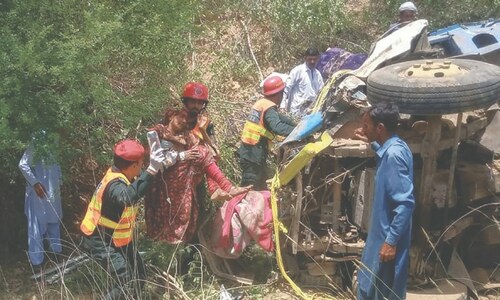WASHINGTON, Oct 12: Experts quoted in a US think-tank report have rejected claims that Pakistan’s intelligence agencies were involved in the Mumbai or London blasts.
The prestigious Council on Foreign Relations (CFR), which has several former secretaries of state and other senior officials among its board members, notes that experts are sceptical about the validity of the recent British and Indian charges against Pakistan.
“The two nations have a history of finger-pointing, and … there is a tendency to exaggerate,” says the report while commenting on the Indian claim that the ISI planned the July bombing of the Mumbai commuter trains.
Endorsing an attack on India, reasons the report, would undermine President Pervez Musharraf’s own policy.
“Pakistan is genuinely trying to open up relations with India,” says Kathy Gannon, who covered the region for decades for the Associated Press.
Marvin G. Weinbaum, an expert on Afghanistan and Pakistan at the Middle East Institute, believes that the British report about ISI’s involvement in terrorist attacks makes “too broad a statement”.
Though Pakistan does offer safe haven to Kashmiri groups, and perhaps some Taliban fighters, the suggestion that the ISI is responsible for the 7/7 bombings of London’s mass transit system is “a real stretch,” Ms Gannon says.
Some experts say President Musharraf exercises firm control over his intelligence agency. “I do not accept the thesis that the ISI is a rogue organisation,” says William Milam, former US ambassador to Pakistan. “It’s a disciplined army unit that does what it’s told, though it may push the envelope sometimes.”
But other experts say that with a reported staff of 10,000, the ISI is hardly monolithic: “Like in any secret service, there are rogue elements,” says Frederic Grare, a South Asia expert and visiting scholar at the Carnegie Endowment. He points out that many of the ISI’s agents have ethnic and cultural ties to Afghan insurgents, and naturally sympathise with them.
The report quotes President Musharraf, who addressed a CFR meeting during his recent visit to the US, as rejecting such allegations as ‘ridiculous.’
In May 2006, the British chief of staff for southern Afghanistan told The Guardian: “The thinking piece of the Taliban is out of Quetta in Pakistan. It’s the major headquarters,” The report notes.
In his address to the Council, Gen Musharraf responded to such accusations, saying “it is the most ridiculous thought that the Taliban headquarters can be in Quetta.”
The report, however, claims that the ISI has supported a number of militant groups in Kashmir and Afghanistan, some of which are on the State Department’s Foreign Terrorist Organisations list.
CFR report quotes Ms Gannon as saying that the ISI’s previous support to these groups consisted of “money, weapons, and training”.
Mr Milam, however, says that “the ISI probably would not define what they’ve done in the past as terrorism.”
The report notes that Pakistani officials deny any current support for the Taliban, which the State Department does not deem a terrorist group but claims that the ISI has supported Afghan insurgents in the past.
Referring to President Musharraf’s recent statement that retired ISI agents may be helping Taliban fighters, the report says: “It suggests his government knows of at least some unsanctioned Pakistani support for the Afghan insurgency.”
The report, however, points out that Gen Musharraf’s acknowledgement also gives him ‘plausible deniability’ of any sanctioned assistance Pakistan is accusing of providing.”
Prof Weinbaum says Pakistan has sent ‘retired’ ISI agents on missions the government could not officially endorse. Some observers believe Pakistan’s duplicity is deliberate: “Musharraf’s been playing with us since day one,” Mr Grare says.
Mr Weinbaum claims that Pakistan has largely ignored Taliban fighters on its soil. “There are extremist groups that are beyond the pale with which the ISI has no influence at all,” he says. “Those are the ones they go after.”
The report quotes some experts as saying that Pakistan wants to see a stable, friendlier government emerge in Afghanistan and believes that an increased Taliban influence, especially in the government, might help achieve this target. “Supporting the Taliban also allows Pakistan to hedge its bets should the Nato coalition pull out of Afghanistan,” the report adds.
“Pakistan has two policies: one is an official policy of promoting stability in Afghanistan; the other is an unofficial
policy of supporting jihadis in order to appease political forces within Pakistan,” says Mr Weinbaum.
The report quotes Ms Gannon as saying that in Kashmir, militant groups serve as Pakistan’s “second line of defence and offence.”













































Dear visitor, the comments section is undergoing an overhaul and will return soon.